If I ask you, what is a brand?
Chances are that your definition will either be different or similar to what mine would be.
You know why?
The meaning of the word “brand” has been misunderstood by lots of people today.
Truly as a concept, it is a complex word with a deeper meaning that most persons do not know about.
Over the years, lots of people think and view it as a trademark.
It is not the same as a brand logo and it’s not the same as a brand name.
As a contemporary marketer, it is imperative to know today’s meaning of a brand. Not as your trademark and your product, but as the totality of who your customers think you are.
Thinking like a savvy marketer requires to keep abreast of what matters today.
After reading this article, you will know exactly the meaning of a brand today and align your thinking with that of savvy marketers.
You Really Need to Think like a Savvy Marketer
Marketing is like a moving train, catch it or remain stagnant like Mount Wycheproof.
I know you don’t want to be stagnant like a mountain, so let’s ride!
Just a few days ago, before I started writing this piece, I walked into a store and asked one of the sales girls to get me soft drinks.
She asked me “which brand”?
Do you think the question was correct?
Well, it may sound correct to her. Why?
Just because she believes that a brand is also the same as a name and a logo.
What Is A Brand Name?
A brand name is a specific word or term used to identify a product or its producer. It is given to a specific product produced by a particular organization.
For example, today one can mention numerous brand names. Like Coke Cola, Coke, Fanta, Nokia, Apple, iPhone 7, BlackBerry, Bold-5, Infinix, LG, MTN, Google, Elites Content, Chrome, etc.
What About A Brand Logo?
This is simply the design, sign, symbol or mark that identifies a company and her products. Most times, they could be unique designs and colors given to certain words and letters.
Take a look at some names and logo below:
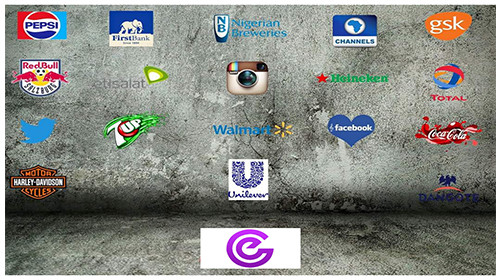
What about a trademark?
A trademark is a combination of name and logo registered for business. It cannot be used by any other person except by the authorization of the owners.
Hence, a trademark is a registered symbol, words, signs, and more. They are usually owned by a particular company.
Now can you see?
There are differences between a brand, its name, and logo. It is paramount to keep the trademark aside for clarity sake.
What Is A Brand Today?
Today’s savvy marketers no longer seeing a brand as only those logos, names, products, trademarks, etc. These are simply known as its elements.
These elements are big parts of it. Today, brands are viewed beyond what you can see and touch.
So, if you’re not thinking like a savvy marketer, sorry because you have a long way to go. Thank God, you are here now.
So What Then is a Brand?
A brand is a totality of what your consumers think you are offering to them, what they expect from your business or organization.
It is your person, mission, promise, action, function, solution, and more embedded in the mind of your consumers.
What do you think differentiates an Apple mobile phone from that of Samsung?
What do you think makes you differentiate Google from Bing?. Is there no difference even as they perform the same search engine functions?
Could it be the color, name, logo alone or what?
Don’t get me wrong. Logo and name are also part but there are more.
Do you think consumers consider the design of Google’s logo if they want to choose a search engine?
No, they don’t
They are looking for a better and smarter way to get the search done, not just nice-sounding names and beautiful logos.
Ok, wait!
If we remove the logo and name of Jumia and Amazon what is left? What really influences an online shopper’s buying decision?
The answer to these questions is what matters most in tody’s business world.
You have created a name and logo what matter most now is the brand. You need to understand that it is everything your customers call it, not what you named or colored.
Did you get it clear?
Here are different views of what a brand is:
Contemporary Thinkers: What They See As A Brand Today
Popular marketing gurus like Seth Godin contributed immensely in explaining the idea behind brands.
Seth explained that the value of brands lies in the extra amount people will be willing to pay, their expectations, memories in relation to alternatives. See how Seth puts it:
Seth Godin
A brand used to be something else. It used to be a logo or a design or a wrapper. Today, that’s a shadow of the brand, something that might mark the brand’s existence. But just as it takes more than a hat to be a cowboy, it takes more than a designer prattling on about texture to make a brand. If you’ve never heard of it, if you wouldn’t choose it, if you don’t recommend it, then there is no brand, at least not for you.
To Allah Dib, a brand is the personality of a business. “You can use the well-understood word “personality” as a direct substitute for a brand.”
The author stated that there more confusion about the idea behind brands. To this effect, there are divergent views about the concept.
In addition, Brian Lischer provided an interesting idea. The author stated that a brand and lives in the mind of the customers. It is not something you can touch or see.
What is the Apple brand? It isn’t computers and phones and other cool stuff we can’t live without. Those are the products Apple manufactures. And it isn’t slick TV ads or dramatically staged presentations or
chicly minimalist storefronts. That’s all marketing and advertising, but still, it isn’t the Apple brand…
Brian Lischer
From Brian’s perspective, a brand comprises lots of things bundled together. It isn’t the product itself or its advertisements.
In a bid to define and differentiate it from a logo, Jennifer Bourn stated that a logo is just a design. To her, brands include experience people get meeting you or your business. See how Jennifer puts it:
A brand encompasses the positioning, the messaging and communications, the visual design, the target market, the voice, the marketing and promotions, the presence, and the experience any individual has with the business, product or service online, offline, or in person.
Jennifer Bourn
For Jeff Bezos, the CEO of Amazon, ” A brand for a company is like a reputation for a person. You earn reputation by trying to do hard things well.”
This prompts the question of “what can you do better?” “Or what problem can your company solve?” The answers are what makes one stand out.
To Jeff, a brand is earned over time. It does not just come by creating a logo or a name.
Jeff Bezos believes that it is all about serving customers, providing an excellent experience and nothing more.
See how Jeff tells the story:
We don’t do any television advertising, and we take all of the money that we would put into television advertising, and instead put it into things like free SuperSaver shipping [free shipping on most orders over $25], lower product prices, category expansion, and the invention of new features.
Jeff Bezos
Are you thinking Like Jeff Bezos ?
Subsequently, Jeff, Amazon’s boss also clarified the concept. In his popular quote, he expressed his thoughts which provide better insights.
Your brand is what other people say about you, when you’re not in the room.
Jeff Bezos
Among the implications of this great quote is, businesses should be thinking about what their customers’ think. Meaning they should be more concerned with their
As a digital agency in Elites Content, we spend less time to think about how much made. But, we mostly think of how many customers we have made happy. And that’s a huge part of who we are.
In the same vein, you don’t need to confuse your brand with its elements.
The reason is that these elements are critical parts that help
Your brand is the totality of what your consumers believe you are while the elements are part what make and strengthen your brand. It is the generality of the consumers’ perception of your business.
What are some of the Functions of the Elements of your Brand?
1. Identification
The first
Your logo, name, your tag line tells part of your story. It enables your brand to have an identity.
Assuming you never heard of Jumia before, how will you recognize it?
It is the elements that make you known
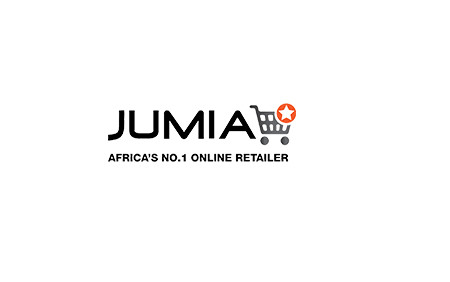
You could first meet the logo which has a shopping cart on it. Or the name which I know they are the only owners of such name in the world.
Also, their tag line – “Africa’s #No 1 Online Retailer”.
All these help to create the identity Jumia needs to stand as an e-commerce company.
Businesses gain identity via consumers’ continuous hearing, seeing, touching, tasting, and have interaction with several elements.
2. Differentiation
The industrialization has already made product proliferation possible which has resulted in an increase in the production of different products has rapidly increased.
There are lots of similar companies, goods, and services. It is not enough to identify but differentiation is also critical.
A brand’s elements make it is easier to differentiate a company or its offers (products) from others.
How can you differentiate Coke, from Pepsi and Big Cola drinks?
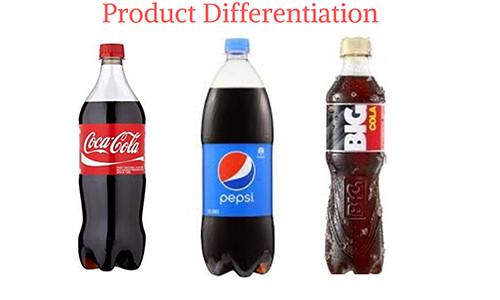
Importantly, one needs to note that there are lots of factors which could aid in differentiating each product. Like logo, name, tag line, and more.
Certainly, products are part of your brand, but not in totality
What makes a consumer to prefer one to another is not just the logo and name but the brand itself which is the totality of what the consumer thinks the company provides for them.
What do you provide for your customers?
Instead of focusing all your attention on name and logo, focus on value and excellent experience.
Like Maya Angelou once said,
“I’ve learned that people will forget what you said, people will forget what you did, but people will never forget how you made them feel.”
Maya Angelou
Consumers will hardly forget how you made them feel.
Final Note
A Brand does not mean the same thing as a logo or name. It is the totality of who you are; built up in consumers’ mind.
A good way to think about it today is to think of what consumers think and not what you think.
That’s because consumers are king and your marketing activities begin and end with them.
Therefore, if you’re still seeing your brand to be your product, color or name, then, you need to think otherwise.
You need to understand that it is everything about your business that can be felt, seen, touched, thought about.
Over to you. Do you agree or disagree with this line of thought?
I’ be glad to hear from you in the comment box below.

Jackson is an obsessed content marketing specialist. A brand storyteller, not a teller of stories. He is passionate about helping online businesses grow with compelling digital marketing strategies. Follow him on Twitter, LinkedIn, and Instagram.
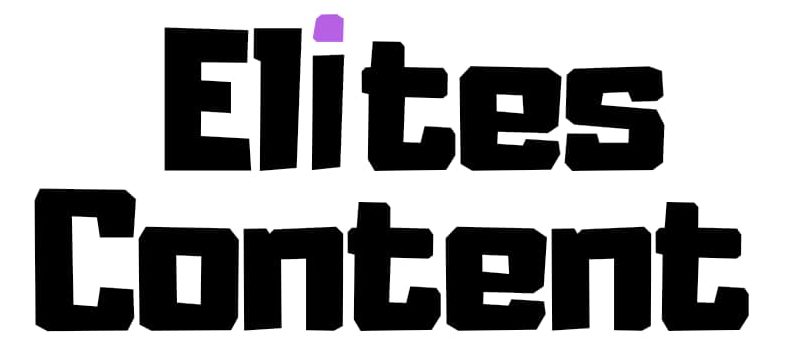
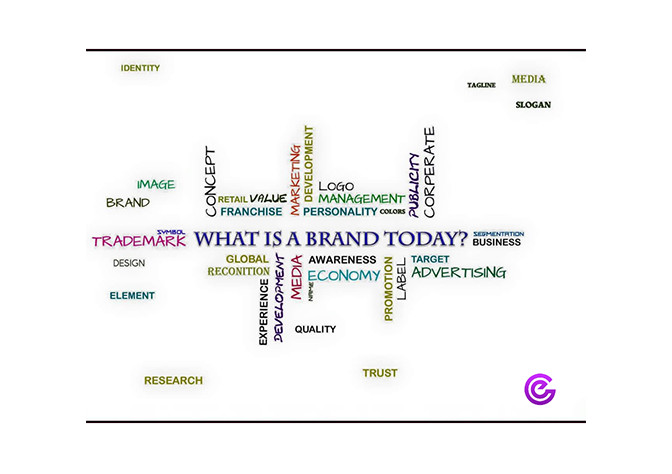
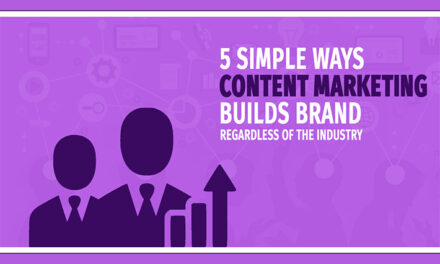
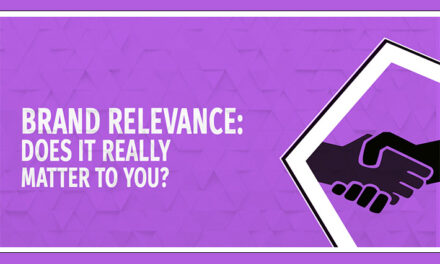

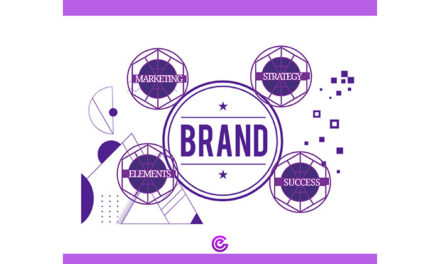
I have always felt there is more to brand than just an identity,I agree with you as you have managed to convince me…thankx ; as the aim behind this content is feasible
Hey Randy. Your feeling that there is more to brand identity is correct. A brand is a totality, not just the identity. Thanks for appreciating my piece.
This is a great piece of work. However I don’t agree that the sales girl was wrong for asking which brand you wanted? I’m in doubt that all she thought about when asking that question was the brand identity (logo et al.). She likely was asking what experience (brand) do you want to have?
Peace.
Hey Godson, I tried to understand your line of argument. If you read through the piece again you will see she was only taking a brand to mean the same as a product which is not the right perspective savvy marketers should have. Nevertheless, thanks for appreciating my piece.
This is very insightful
Hi Victoria. Thanks for finding it insightful
Nice content, I have learnt so much from this post. Thanks.
Hi,thanks Nkechi for appreciating my work. Hope to get something greater from us soon.
This is fascinating.. It has given me a new perspective to branding.. Nice piece
Hi Felix, thanks for appreciating my work. Am glad you found it helpful to change your perspective positively. I hope you make informed brand-related decisions now.